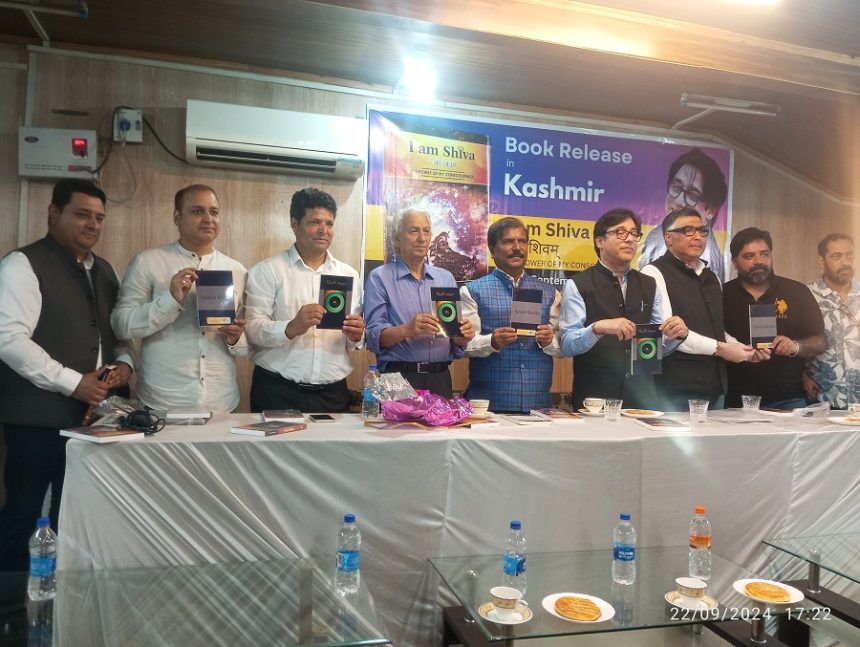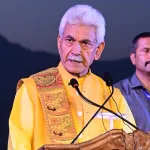Srinagar, Sept 22 : “I Am Shiva,” a book authored by Dr. Raj Nehru, Vice Chancellor of Shri Vishwakarma Skill University, was launched at Press Enclave in Srinagar on Sunday.
Professor Ravindera Nath, Vice Chancellor of Central University Of Kashmir, served as the Chief Guest at the book release function, with Professor M.H. Zaffar as the Guest of Honour.
“I Am Shiva” (Aham Shivam) is based on the philosophical teachings of the Pratyabhijñā Hṛidayam.
Speaking on the occasion, Dr. Raj Nehru shared that his personal quest to know himself led him to write the book. He mentioned that for the past two years, he had been conducting research on the subject.
While some literature was available in libraries, he had to obtain other resources from different sources. Most of the literature was in Sanskrit, which he could not read. “My limitation was that I had to rely on transcribed texts,” he said, adding that he primarily referred to the translations by Dr. Jaideva Singh, regarded as the most authentic translation of Pratyabhijñā Hṛdayam.
Dr. Nehru also touched upon the concept of quantum physics, which suggests that the entire universe is a substratum of vibrating energy, leading him to explore the concept of Om. He said that when he started reading about Om, it stopped being just a religious symbol for him. According to him, leftover material in space creates a humming sound, sending vibrations.
The book, which consists of seven chapters, aims to present the philosophy of Kashmir Shaivism from a psychological perspective. Dr. Nehru emphasized that for living, one must have a vision, and that vision is developed through self-awareness or consciousness. He categorized consciousness into three levels: Transactional, Transformational, and Transcendental.
According to him, transitioning from one level to another enhances one’s understanding of consciousness until it merges with the unlimited universal consciousness.In the book, the author discusses the descent of macrocosmic consciousness to the microcosmic level, and how individuals can explore and practice consciousness to eventually return to the macrocosm.
Dr. Nehru also delves into the concept of Maya (Illusion), which prevents individuals from perceiving the transformation of energy across different levels. He further elaborates on how ancient experiential science relates to modern-day, data-driven, evidence-based science.
Professor M.H. Zaffar, an eminent scholar, emphasized that Kashmir Shaivism is a philosophy of consciousness. He explained that it is a form of yoga that anyone can practice, without discrimination based on caste, creed, or religion.
“Shiva means good or ‘Khair.’ It represents absolute good, the light that is self-conscious,” he said. He further noted that modern physics posits that reality is a vibration of light, from which everything evolves. In Kashmir Shaivism, vibration is essential, and consciousness, though limited in our minds, is part of the unlimited universal consciousness. Acquired knowledge, he said, is a manifestation of consciousness.
Professor Zaffar highlighted that, according to this philosophy, there is no distinction between human beings. “To recognize God, you need to know yourself,” he said, summarizing the core message of Dr. Nehru’s book.
He congratulated Dr. Nehru for writing the book and expressed hope that readers would find it useful in applying the philosophy in their daily lives.
Professor Zaffar has made an effort to translate it into Kashmiri, preserving it for future generations, and has contextualized the text with references to Kashmiri Sufi poets.In his speech, Professor Zaffar discussed the interpretation of Shaivism as envisioned by great Sufi scholars of Kashmir, such as Sheikh Noor-ud-Din Noorani.








